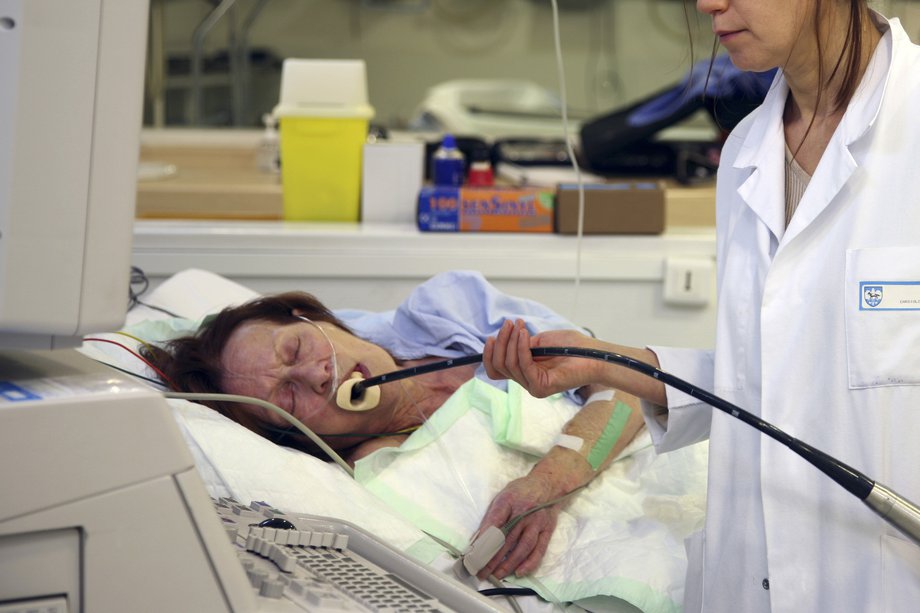Endoscopic Ultrasound (EUS) in Russian Federation
Search and Compare the Best Clinics and Doctors at the Lowest Prices for Endoscopic Ultrasound (EUS) in Russian Federation

Find the best clinics for Endoscopic Ultrasound (EUS) in Russian Federation
No clinics available

- Home
- Russian Federation
WHY US?
At Medijump, we're making medical easy. You can search, compare, discuss, and book your medical all in one place. We open the door to the best medical providers worldwide, saving you time and energy along the way, and it's all for FREE, no hidden fees, and no price markups guaranteed. So what are you waiting for?

Free

Best Price

Widest Selection

Risk-Free
What you need to know about Endoscopic Ultrasound (EUS) in Russian Federation

Endoscopic ultrasound (EUS) is a procedure that allows your doctor to attain information and images of your digestive tract as well as the surrounding tissues and organs. It is used to assess gastrointestinal and lung disease. Endoscopic ultrasound can help in the evaluation of lymphoma, bile duct stones, pancreatic cysts, neuroendocrine tumors, as well as cancer of the esophagus, lung, colon, stomach, pancreas, rectal, and ampullary.
What does a Endoscopic Ultrasound (EUS) Procedure Involve?
During an endoscopic ultrasound, you may be given sedation and anesthetic to help you relax. Then, your doctor will insert an endoscope with a small ultrasound device installed on its tip into your digestive tract. An endoscope is a tiny, flexible tube that has a light and camera attached to its end. The ultrasound will provide more detailed and accurate images than traditional ultrasound.
How Long Should I Stay in Russian Federation for a Endoscopic Ultrasound (EUS) Procedure?
Endoscopic ultrasound is an outpatient procedure, meaning you can leave the hospital immediately after the procedure. However, you will need to stay in Russian Federation for around 7 to 8 days because the detailed results normally take about a week before they are available.
What's the Recovery Time for Endoscopic Ultrasound (EUS) Procedures in Russian Federation?
You will be monitored for about an hour after the procedure. You will be advised to take it easy for the rest of the day. Unless the result shows that you have a serious medical condition, you will be able to get back to your normal routine within a day or two.
What sort of Aftercare is Required for Endoscopic Ultrasound (EUS) Procedures in Russian Federation?
Within the first hour after the procedure, you will only be allowed to drink water. It may take a little longer until you can eat food. There is no special diet or exercise you need to do, except if the result shows that you have a medical condition. You may need a follow-up visit with your local doctor to go over the results.
What's the Success Rate of Endoscopic Ultrasound (EUS) Procedures in Russian Federation?
Several studies show that the rate of complications after an endoscopic ultrasound is very low, meaning it is a very safe procedure. The risks and side effects may include infection and bleeding, but that is very rare.
Are there Alternatives to Endoscopic Ultrasound (EUS) Procedures in Russian Federation?
Since endoscopic ultrasound gives unique and accurate information, there are no real alternatives to this procedure. However, if you do not want to undergo this procedure or if the procedure results in misdiagnosis, traditional ultrasound or X-ray can be an option.
What Should You Expect Before and After the Procedure
Before an endoscopic ultrasound, your doctor may not be able to confirm their diagnosis of your condition. After the procedure, your doctor is provided with precise information regarding your digestive tract, which allows them to evaluate and consider the treatment options for your case.
Whilst the information presented here has been accurately sourced and verified by a medical professional for its accuracy, it is still advised to consult with your doctor before pursuing a medical treatment at one of the listed medical providers
No Time?
Tell us what you're looking for and we'll reachout to the top clinics all at once
Enquire Now

Popular Procedures in Russian Federation
Prices Start From $614

Endoscopic Retrograde Cholangiopancreatography (ERCP)
Prices Start From $614
See prices & compare resultsPrices Start From $131

Prices Start From $47

Recommended Medical Centers in Russian Federation for procedures similar to Endoscopic Ultrasound (EUS)

- Interpreter services
- Translation service
- Religious facilities
- Medical records transfer
- Medical travel insurance
- Health insurance coordination
- TV in the room
- Safe in the room
- Phone in the room
- Private rooms for patients available

- Interpreter services
- Translation service
- Religious facilities
- Medical records transfer
- Medical travel insurance
- Health insurance coordination
- TV in the room
- Safe in the room
- Phone in the room
- Private rooms for patients available

- Interpreter services
- Translation service
- Religious facilities
- Medical records transfer
- Medical travel insurance
- Health insurance coordination
- TV in the room
- Safe in the room
- Phone in the room
- Private rooms for patients available
Endoscopic Ultrasound (EUS) in and around Russian Federation
The Russian Federation, or Russia, is a transcontinental country that stretches over a vast expanse of Eastern Europe and northern Asia. Once a mighty tsarist empire and a communist superpower, this massive country is enigmatic, intimidating, and fascinating all at the same time. It has everything, from the idyllic countryside and historic cities to scenic beauty and artistic riches. Today, Russia is a famous medical tourism destination. The number of medical tourists seeking high-quality healthcare continues to double each year. These medical tourists mainly come from Asian countries, such as China, South Korea, India, Japan, and Vietnam. They come to receive a wide range of medical care, with IVF treatment, dental services, cosmetic surgery, and cardiovascular surgery being the most sought-after.
Popular Parts of the Russian Federation
Most visitors are drawn to the western part of the country, particularly to Moscow and St. Petersburg. Moscow, the capital of Russia, is popular for its show-stopping architecture, rich history, amazing culture, and great food. Some of the most famous landmarks are the St. Basil’s Cathedral, the Red Square and the Lenin Mausoleum, the Moscow Kremlin, The Tretiakov Gallery, and the Wooden Palace of Tsar Alexei Mikhailovich. St. Petersburg, Russia’s second city and imperial capital, is one of the most gracious cities in Europe. People come to this city to visit the State Hermitage Museum, the Grand Palace, and Catherine Park.
Weather and Climate in the Russian Federation
There are four seasons in Russia. December to February are the winter months, which is cold and snowy, with short days and long nights. The average temperature during this season is around -10°C to 3°C. Spring comes in March, bringing warmer, but rainy weather. Summer, from June to August, is hot and humid, with an average temperature of around 12°C to 26°C. The weather can be quite unpredictable in the summer, and downpours can come unexpectedly. Autumn is from September to October and is warm and pleasant.
Getting around in the Russian Federation
The largest airport in Russia that receive the most international flights is Sheremetyevo Alexander S. Pushkin International Airport in Moscow. It serves both domestic and international flights to many cities around the globe. Since Russia is the world’s largest territory, internal flights are the fastest and most convenient way to get around. Trains have an extensive network, and, with many comfortable overnight services, is considered as the best way to get around. Buses are a great option to travel to the areas not covered by the train. Some really remote destinations may only be reached by private cars or taxis. Taxis are relatively inexpensive and widely available.
Tourist Visas in the Russian Federation
Nationals of 62 nations, including Brazil, South Africa, South Korea, North Macedonia, and Hong Kong, can visit and stay in Russia without a visa for a period of 14 to 90 days. Citizens of other countries not listed in the visa exemption agreement need a visa to enter. Electronic visas are available for citizens of several countries, including all EU countries, China, and India.
Additional Information
- Local Currency: Russian uses the Russian ruble (RUB) as its official currency. 1 USD is equivalent to 77.16 RUB.
- Money & Payments: The easiest way to get rubles is by using ATMs, which is available throughout the country. Major credit and debit cards, including MasterCard and Visa, are accepted in larger hotels and restaurants, but cash is more reliable. Some places may offer to accept euros and dollars, but this is illegal. Tipping is expected, around 10% to 15% of the bill. Always tip in cash and give it directly to the waiter.
- Local Language: There are over 100 minority languages spoken in Russia, but the official and most widely spoken language is Russian. English is spoken to some degree, especially in major cities.
- Local Culture and Religion: Most of Russia’s population adheres to Christianity, with the Russian Orthodox Church being the biggest Christian denomination. There are also small groups of Muslims, Buddhists, and Jewish.
- Public holidays: New Year’s Day, Orthodox Christmas Day, Defender of the Fatherland Day, Victory Day, Russia Day, and Unity Day are some of the most important public holidays in Russia.
Popular Searches
- Plastic Surgery in Thailand
- Dental Implants in Thailand
- Hair Transplant in Thailand
- Breast Augmentation Thailand
- Gastric Sleeve in Thailand
- Gender Reassignment Surgery in Thailand
- Laser Hair Removal in Bangkok
- Botox in Bangkok
- Dermatology in Bangkok
- Breast Augmentation in Bangkok
- Coolsculpting in Bangkok
- Veneers in Turkey
- Hair Transplant in Turkey
- Rhinoplasty in Turkey
- Stem Cell Therapy in Mexico
- Rhinoplasty in Mexico
- Liposuction in Mexico
- Coolsculpting in Tijuana
- Rhinoplasty in Korea
- Scar Removal in Korea
- Gastric Sleeve in Turkey
- Bone Marrow Transplant in India
- Invisalign in Malaysia
- Plastic Surgery in the Dominican Republic
- Tummy Tuck in the Dominican Republic
- Plastic and Cosmetic Surgery in Poland
- Rhinoplasty in Poland
- Hair Implant in Poland
- Dental Implants in Poland
- IVF in Turkey